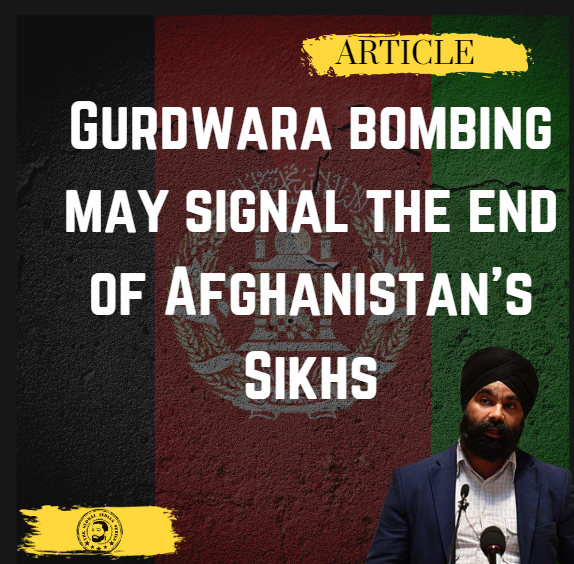The Afghan ambassador to India described Islamic State’s bombing of a Sikh temple in Kabul as an “attack on the entire civilised population of Afghanistan”. Narendra Modi, India’s prime minister, called it “barbaric” and “ghastly”.
The Islamic State-Khorasan (Isis-K) attacked the Gurdwara Karte Parwan in Kabul’s Bagh-e Bala area on Saturday, killing at least two people, including a Sikh devotee, Savinder Singh, and an employee of the gurdwara. Several others were injured.
The attack is reported to be “an act of revenge” following comments made by members of the ruling Bharatiya Janata Party about the Prophet Muhammad.
Saturday’s bombing is part of a long and consistent pattern of deadly attacks against minority faiths and their places of worship in Afghanistan, including Hazaras, Christians, Bahá’ís, Ahmadi Muslims, Hindus, and Sikhs. But for Sikhs, who have resided in Afghanistan for centuries — and are more visible — this appears to be the final chapter in that history. It is no exaggeration to say they face extinction.
Although the exact numbers are difficult to confirm, a recent UK Home Office report estimates that, before 1992, there may have been as many as 220,000 Hindus and Sikhs in Afghanistan — although another account puts that number as low as 50,000. A recent BBC report indicates there are now only 140 Sikhs left in Kabul.
It is said that what we are witnessing is the ethnic cleansing of Sikhs, systematically targeted and forced to leave their country through violent jihad and persecution.
In March 2020, an Islamic State gunman murdered 25 Sikh worshippers in a Kabul gurdwara, including women and children, and in 2018 a suicide bomber murdered a delegation of 19 Hindus and Sikhs in Jalalabad.
Under the previous Taliban rule of 1996-2001, Hindus and Sikhs who did not manage to flee Afghanistan were forced to wear yellow tags to denote their status as dhimmi (non-Muslims living in an Islamic state) and pay the jizya — a tax of humiliation. The parallel with Nazi badges to identify Jews and other minorities is striking.
British Sikh parliamentarians have been raising the plight of Afghanistan’s Sikhs for some time. After the Jalalabad suicide bombing, crossbench peer Lord Singh of Wimbledon, asked the British government: “What representations they intend to make to the government of India to encourage it to offer asylum or safe passage to Sikhs wishing to leave Afghanistan?’ The question was not directly answered, with the response merely confirming that the UK raised human rights with the government of Afghanistan.
After the 2020 Kabul gurdwara murders, Tanmanjeet Singh Dhesi, the MP for Slough, tweeted: “Deeply saddened to hear of the abhorrent terrorist attack on a Sikh gurdwara in Kabul.” Dhesi did not elaborate, however, on the ideology behind the terrorism, and the minister with whom he raised the issue was unaware of the killings and said he had been focused on the government’s response to Covid-19.
These examples perpetuate the conviction that getting the persecution of Sikhs and other minorities in Afghanistan acknowledged in the West has always been an arduous task.
I spoke to Gurmeet Singh, chairman and trustee of Guru Nanak Darbar gurdwara in Southall, west London. He told me: “Sikhs in Afghanistan are a minority within a minority” and that the attack of Karte Parwan gurdwara was devastating.
The Southall gurdwara serves a population of about 30,000 Sikhs, and many of the families have generational links with Afghanistan, some having escaped persecution themselves. This week, the sangat (congregation) held prayers for those that had died in this latest atrocity. In the spirit of Sikhism, the remembrance included the gurdwara’s Muslim security guard who died in a gun battle with Isis-K.
Gurmeet Singh said although 140 or so Sikhs were thought to remain in Kabul, it is not known how many were left in other prominent Afghan cities, such as Kandahar. It was vital, he said, that some Sikhs stayed behind to look after the historic gurdwaras, which would otherwise be desecrated or reduced to rubble.
Among the chaos, murder and mayhem there is, however, a glimmer of hope. Within hours of the attack, the Indian government issued 111 visas to Afghan Sikhs. Lord Singh tabled a written question to the UK government: “In preparation for the International Ministerial Conference on Freedom of Religion or Belief, what steps they will take to help protect the lives of Sikh families remaining in Afghanistan?”
Sikhs in the UK hope that the government acknowledges this plea, and the forthcoming conference gives the predicament of Sikhs in Afghanistan the prominence it so urgently deserves.
Hardeep Singh is deputy-director at the Network of Sikh Organisations and a contributor to the Global Indian Series
-------------------------------










